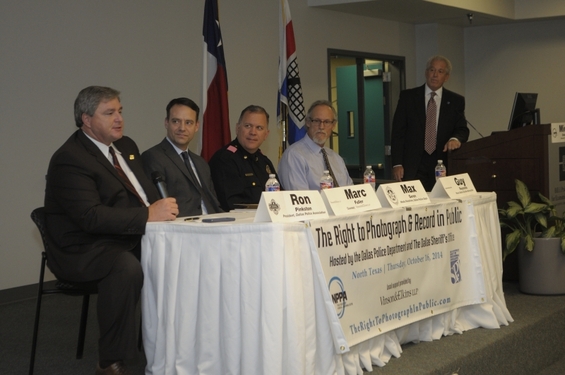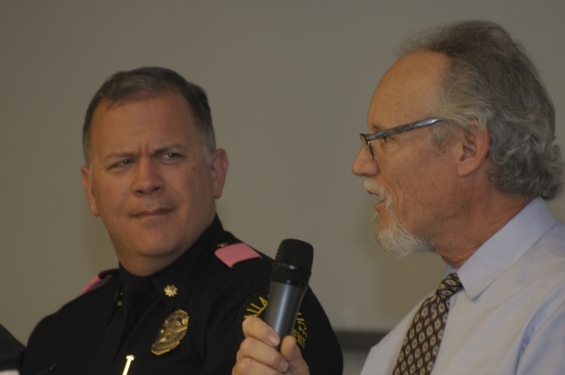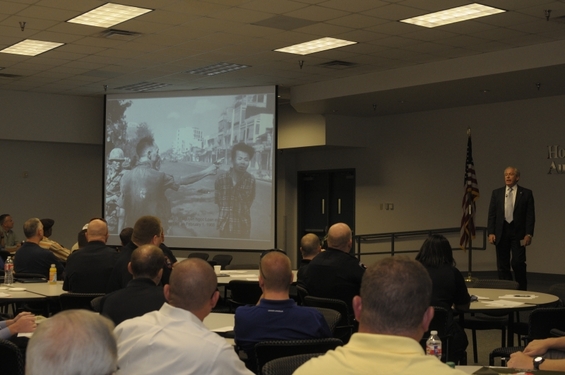Dallas Police Are Better than Most in Dealing With Photographers and Cop Watchers
Max Geron, the Dallas Police Department's media relations officer, smiled and shook his head in disbelief. In the video, a veteran East Coast police officer approached a photojournalist, who was standing across the street from a traffic stop with multiple squad cars present, and told him to leave. The officer didn't seem to know that, as long as they don't insert themselves into the scene, citizens and journalists have the right to film officers in public. Also, within reason, officers have the right to keep those taking pictures a certain distance away. However, "'Go away and step off the face of the earth' is not reasonable," said the moderator of a panel on the issue Thursday night, which is essentially what the East Coast officer told the photojournalist. 
Avi S. Adelman/NPPA A panel on people's rights to film and photograph police officers included two lawyers, two officers and a photojournalist.
The moderator, a former photographer and a current media-rights lawyer, said that police officers have a sensitivity toward one of their own being filmed, and that's when Geron, who publicly is a progressive on policing, took the mic to defend not the East Coast officer's behavior, but the mentality that may lead to it.
"Everyone writes the same essay for the Dallas Police Department," he began. "It has to do with wanting to help people and change the society, help make a difference in a positive way. I wrote the same thing. I fully believe that, and I believe that from every officer who writes that. In that goes along this idea of protection and taking care of those that can't do for themselves or have been victimized, and I think it goes into human nature of the individual officers.
"I think it's an internal struggle that we have to overcome and we have to deal with and detach ourselves because we see terrible things," Geron continued. "We see things that no human being should have to see, on an almost daily basis. We have to be able to detach ourselves from that and apply the law as we know it and not overstep those bounds. I think that goes to the heart where you have these problems. Some officers can't detach and can't make that break and say, 'OK, I really don't want this guy shooting this video of this family that is just tragically killed in a car wreck.' But to say, 'You know, it's a very tragic situation. He's where he can be.'"
See also:
- Dallas Police Department Will Host a Class For Officers on the Rights of Citizens to Film Cops
- Three Cop Watchers Get Arrested for Videotaping Arlington Police
Geron said this at a panel discussion hosted by the National Press Photographers Association, an organization that advocates for professional photographers' rights. The other panelists included Ron Pinkston, the Dallas Police Association's president; Marc Fuller, a media lawyer; and Guy Reynolds, The Dallas Morning News' photo editor. Mickey Osterreicher, the NPPA's lawyer, moderated.
"We teach all of our officers that you can't restrict the media any more than you can the public," Geron said. "We try to teach our officers to not demarcate their crime scenes in an overly broad fashion with a specific intent of restricting the media, or restricting photography, because we understand and try to convey to the officers that the media has a job to do, it's an important job and all we do is engender bad blood when we overstep that and stretch the crime scene tape out a whole lot farther than we need to."
Ultimately, the discussion came down to the struggle between citizens' First Amendment rights to film police officers, and the safety of those same officers.
"We've had 80 officers killed in the line of duty in the city of Dallas," Pinkston said. "It's a dangerous job. Max has a family. I have a family. We all want to go home at the end of the night. When we pull somebody over in a traffic stop, it's dangerous. We don't know who's in that car in front of us. [Someone pulling behind us to film changes] our focus, not only from the car we're going to, [but] I don't know you're here just to film."
Those in attendance, mostly photographers, believed the DPD did a good job not interfering with their ability to take photos, with some exceptions. The photo editor described an incident where an officer bruised a News' photographer while trying to stop him from taking a picture of an accident. Overall, though, many agreed most of the problems were with the smaller jurisdictions. 
Avi S. Adelman/NPPA Maj. Max Geron reacts to Morning News photo editor Guy Reynolds' account of a Dallas officer interfering with one of his photographer's ability to photograph a car wreck.
"Enforcement is not the same," Derrick Waiters, a freelance photographer, told the panel. "If I photograph El Centro College from a public street, I'm not going to have a problem with DPD. Let me take this over to SMU on a public street, and I'll be needing Marc's services very quickly," referring to the media lawyer.
Waiters wanted other departments to be trained like the DPD in regards to the right to photograph a scene. "I can tell you," he said, "it does not happen the same in Allen and Plano and Highland Park and various other agencies."
Later, Pinkston said that those other departments look to the DPD as a leader and that, eventually, those other agencies would follow suit.
Although most attendees agreed Dallas was better in this area, incidents are still a possibility. At one point, in response to a video of a law enforcement officer swiping a camera phone out of a young man's hand (the young man, clearly not a journalist, seemed to be baiting the officer into doing something), Pinkston said he hoped his officers wouldn't do something like that.
"I'm sure that department hoped it's officers wouldn't do that," Osterreicher, the moderator, said, and the room chuckled.
There was a four-hour class Thursday morning for officers only, and several DFW departments were represented. Geron said Highland Park officers attended, and that several officers from the Arlington Police Department were there as well. In September, Arlington officers arrested three cop-watchers for filming a traffic stop from a sidewalk. 
Avi S. Adelman/NPPA At the morning class, moderator Mickey Osterreicher tells a room full of Texas police officers what they can and can't do in regards to people filming.
"The turnout we had today," Geron said, "not just from the North Texas region but from across the state is a testament to their understanding that there is an issue and that we want to be on the right side of the law."
Send your story tips to the author, Sky Chadde.








































